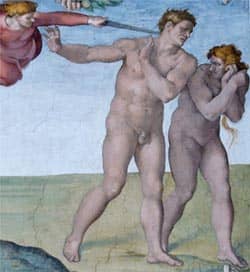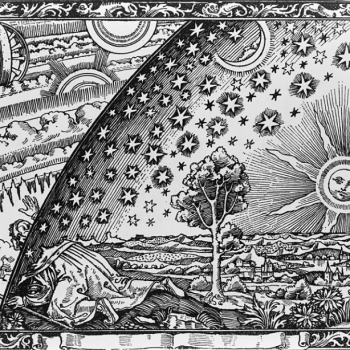The woman saw that the tree was good for food, pleasing to the eyes, and desirable for gaining wisdom. So she took some of its fruit and ate it; and she also gave some to her husband, who was with her, and he ate it.
Then the eyes of both of them were opened, and they realized that they were naked; so they sewed fig leaves together and made loincloths for themselves.
. . .
Then [the Lord] said, "Where are you?"
[Adam] answered, "I heard you in the garden; but I was afraid, because I was naked, so I hid myself."
Then [the Lord] asked, "Who told you that you were naked?" (Gen. 3:6-7,9-11)
 I like the question, "who told you that you were naked?" Prior to this consciousness Adam and Eve were happily running around naked, like every other creature in the wild. Then: awareness. And what was the awareness? That their nakedness was "dirty"? Unlikely.
I like the question, "who told you that you were naked?" Prior to this consciousness Adam and Eve were happily running around naked, like every other creature in the wild. Then: awareness. And what was the awareness? That their nakedness was "dirty"? Unlikely.
Animals do not perceive their nakedness or try to protect their genitalia, but suddenly, Adam and Eve were doing just that. Why? Evolution? Fruit?
What matters is that suddenly they knew more than they had known, and what they knew—what they suddenly understood—was that they were vulnerable.
Their awareness of their vulnerability might have led to their excuse-making, too. Until that point they had enjoyed a blissful relationship with the Creator; nothing that had passed between them and God should have given them a quick rise to fear. Yet suddenly attuned to their vulnerability, they feared enough to hem and haw and look for someone else to blame.
Aside from serpent, there was only each other.
We tend to think of the first sin as one of simple disobedience, and perhaps it was. But perhaps there was another component that deepened the offence—the lack of trust, manifested in a refusal to be wholly seen; humans covering themselves up both physically and metaphorically, with fig leaves and with the sloughing off of blame onto others, rather than revealing themselves and taking responsibility for their actions.
The taint of Original Sin: God has been trying to get us to trust Him, to reveal ourselves to Him and to be vulnerable and open to Him ever since.
Perhaps this explains the command by God for the Jews to circumcise the men. The foreskin of the penis affords some protection for the organ—a bit of shelter, a place to hide. When God chose the Jews as His own, he required this symbolic (and real) acquiescence, this willingness to be completely vulnerable and exposed to whatever may come. The unsheathed penis is extraordinarily sensitive and responsive—precisely the qualities God wanted of the Jews. He made a covenant with them; He would be their God, they would be His people, and the deal was sealed in blood. At its shedding, man and God are bonded.
The need to be vulnerable and open to God is part and parcel of having a real relationship with Him, just as it is the necessary component in human relationships. We see the blood covenant and the need for vulnerability and openness mirrored in the relationship between a husband and wife—or we did, when virginity was kept for marriage. The thin membrane of the hymen is a kind of counterpart to the foreskin. In shedding the foreskin the Jew becomes openly vulnerable to God. In remaining a virgin until marriage, the woman becomes vulnerable only (but fully) to her husband, and he—in receiving that vulnerability—answers only to her, gives his deepest self and the sweat of all of his labors to her. It is another blood covenant. At the shedding of that blood, they become one flesh. One entity.
When we talk of Jesus, the bridegroom shedding blood for his bride the church, we might remember that his bride shed blood at the beginning, and still does so, today.
Why do we not know that? Why is it never taught that way? For centuries and centuries virginity was little more than a premium—a selling point for chattel—and even today, in some cultures, that idea remains.
God says, "be my people," and there is a blood covenant. A man and woman say "be mine" and there is a blood covenant. We have never understood.
So God becomes Incarnate and tries to explain: be opened. I will show you how. I will make myself vulnerable to you. You may have my blood. It is shed for you and for all so that sins may be forgiven.
It is the greatest of the blood covenants, because the blood covers and draws into oneness not a tribe, nor a mate, but an entire creation—for better or worse. The marriage of heaven to earth, God to man; a true consummation. From the cross Jesus said, "it is consummated" (Jn. 19:30). This covenant is renewed daily, in the mass; the shedding of blood continues in the martyrdoms within the bride, even to today.





